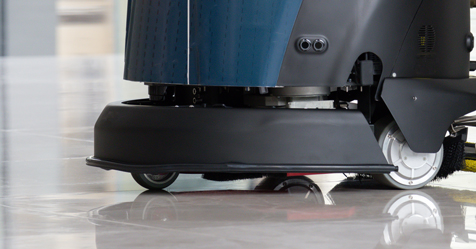The custodial industry is undergoing a profound digital transformation, driven by the rapid adoption of Artificial Intelligence (AI) technologies—both within the industry and beyond.
While the custodial sector is traditionally known for its labor-intensive processes and manual oversight, it is now starting to embrace AI-powered solutions to meet the rising industry demands for efficiency, sustainability, and cost control. With a projected global custodial service market size of US$367.48 billion by 2030—and a compound annual growth rate (CAGR) of 4.1% from 2024 to 2030—AI is positioned to help grow the industry and become a cornerstone of modern facility management and custodial operations.
From streamlining inventory management and predicting equipment maintenance needs to optimizing workforce allocation and enhancing data visibility, AI is revolutionizing the way custodial services are planned, delivered, and evaluated. By automating routine tasks and providing actionable, data-driven insights, AI empowers facility managers to make smarter decisions, reduce operational waste, and improve custodial service quality.
As the industry navigates a future shaped by innovation and technological advancements, companies that effectively leverage AI could not only enhance their operational efficiency but also gain a competitive edge in a rapidly evolving market.
Predictive maintenance
One of the most significant impacts of AI in the facility solutions sector is predictive maintenance. Utilizing AI-powered sensors, facilities can monitor equipment and operations performance in real time. This allows for early detection of potential failures, enabling maintenance teams to address issues proactively, before they escalate into costly equipment breakdowns. This not only reduces the facilities’ downtime and maintenance expenses but also extends the life of crucial cleaning and maintenance equipment. Leveraging the Internet of Things (IoT), custodial staff can also remotely monitor dispenser consumable levels and refill them before a stockout occurs. AI assists facility managers in creating plans based on peak usage hours, enabling custodial staff to effectively maintain facilities. Additionally, AI can trigger real-time alerts for staff when usage spikes occur. This ultimately enhances patron experiences by ensuring products are always available at the point of use, without adding strain on maintenance staff. Predictive maintenance optimizes employee experiences, boosts organizational productivity, extends equipment lifecycles, and ensures smoother operations across the facility.
Energy management
AI also plays a pivotal role in energy management, a growing concern for organizations aiming to improve sustainability while managing operational costs. Advanced AI systems analyze historical and real-time energy usage patterns across facilities. By optimizing systems such as heating, ventilation, and air conditioning (HVAC), along with lighting and other utilities, AI-driven solutions can substantially reduce energy consumption. In addition to lowering overall operational costs, these solutions align management facilities with sustainability objectives, fostering a greener approach to facility and business management.
Smart cleaning
The rise of autonomous cleaning technologies is another hallmark of AI’s impact. With the introduction of sophisticated cleaning robots and AI scheduling tools, cleaning equipment can now automatically determine the most efficient cleaning routes and times based on real-time foot traffic and usage patterns. This enhances cleaning efficiency and consistency, ensuring that high-traffic areas receive optimal attention while minimizing disruptions to occupants. Moreover, the reduction in manual labor needs and cleaning supplies results in significant cost savings for organizations.
Space utilization
The capabilities of AI extend beyond enhancing cleaning functions to include space optimization. By analyzing occupancy and usage data, AI can help optimize layouts and improve operational workflows. By reconfiguring layouts according to actual usage patterns, organizations can enhance the overall experience for occupants while effectively utilizing their available space. Space utilization also plays a crucial role in implementing smart floor cleaning solutions.
Supply chain management
As the custodial industry embraces digital transformation, AI plays a critical role in effective supply chain management by reducing operating expenses, forecasting demand more accurately, and optimizing procurement workflows. By analyzing historical data, market trends, and real-time usage patterns, AI can anticipate supply needs before shortages occur, helping businesses avoid costly overstocking while reducing waste. Autonomous robot solutions can also reduce handling costs and increase efficiency by unloading containers imported from abroad. AI-powered platforms automate order processes and flag potential disruptions in the supply chain, providing managers with greater visibility and control over their operations. By minimizing excess inventory and unnecessary shipments, this data-driven approach enhances efficiency, reduces costs, and supports sustainability efforts.
Looking ahead
The integration of AI technologies offers innovative solutions that address today’s operational and cleaning challenges and lay the foundation for a more responsive, sustainable, and efficient future in the custodial industry. As the custodial industry continues its digital transformation, AI-driven advancements are unlocking new efficiencies, improving service quality, creating safer environments, and enhancing decision-making—ensuring that custodial services thrive in an increasingly demanding and cost-conscious market, both now and for decades to come.




